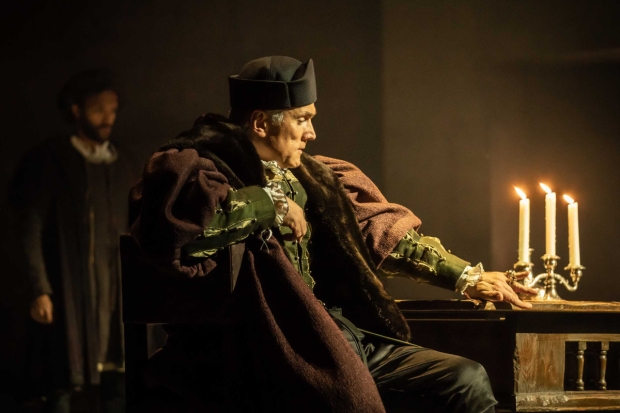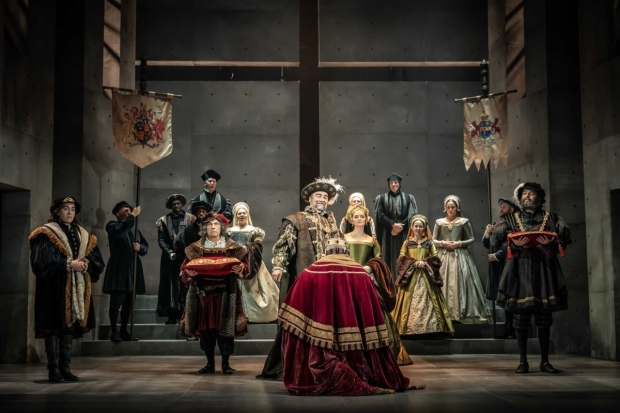The Mirror and the Light review – Hilary Mantel's Cromwell chronicle comes to the West End
Ben Miles takes on the lead role in the premiere

© Marc Brenner
The first two books of Hilary Mantel's epic trilogy about the life and times of Thomas Cromwell were uniquely successful in three media: on the page, on TV, and on the stage, as performed by the Royal Shakespeare Company. It was inevitable, then, that when the third book appeared, a play would follow close on its heels.
The Mirror and the Light, adapted by Mantel and her star Ben Miles, who has been quite remarkable in breathing life into the theatrical Cromwell, isn't quite the success of its predecessors, even if the strength of the story and the playing make it a superior historical drama.
This is partly to do with the nature of the book itself: more meditative and more melancholy than its predecessors, it lives very much in Cromwell's mind. It is bound by the inevitable arc of its fact-based story: Cromwell has risen high in the service of Henry VIII, now he too must fall. The sheer energy of his success is replaced by the sadness of his decline.
There's also a hefty chunk of exposition to climb through if the play is going to work as a dramatic entity in its own right. It begins with Cromwell already in the Tower, facing his execution on trumped up charges of treason, and there's an awful lot of "he was my man, then he was yours" type dialogue to crawl through before he begins to remember his life and the play starts to take flight.
It all looks incredibly handsome. Christopher Oram's classy plain stone set, dominated by a huge cross of a window, with steps and a raised platform at the back, works brilliantly as a setting for a richly costumed court, an abbey under threat of dissolution, or a prison cell. All are enhanced by Jessica Hung Han Yun's lighting, Nick Powell's sound design and Stephen Warbeck's period music.

© Marc Brenner
Jeremy Herrin's direction keeps things moving at a speedy lick, as Henry VIII (Nathaniel Parker, all puffed up in finery) finds love with Jane Seymour and takes against Anne of Cleves, the event that leads to his trusty adviser's downfall. Some of the best moments are the quietest ones: when Henry huddles in front of the fire, Parker reveals the frightened boy behind the monster. Alone in his cell, Miles allows terror as well as remembrance to flit across his face.
The great events are staged with panache and dancing. There are some good jokes, and a gentle amount of pointing towards the present, most notably when the Pilgrimage of Grace is described by Henry as a desire to have England's |golden age back|. There's also a wonderful section at the close of the first half when the women whose concerns have been relegated by the way that the men of the court treat them as so many chattels sing softly as events unfold, beyond the reach of power.
Acting-wise it's lovely to see that the RSC and casting director Helena Palmer have cast many young actors at the start of their careers. Some make a strong mark: Rosanna Adams is radiantly confused as the put-upon Anna, Jordan Kouamé straight-forward and touching as Cromwell's adopted son Rafe. Inevitably, however, a lot of the heavy lifting falls to more established talent and Nick Woodeson as a positively vicious Norfolk and Nicholas Boulton as a roaring Suffolk do not disappoint, though some of the other characters tilt towards pantomime.
Towering above them all is Miles as Cromwell. If his adaptation emphasises the role of class in Cromwell's fall – neither nobility nor commoners can accept his "vile blood" – his performance emphasises the way that a man who has risen from butcher's brutalised son to the highest in the land must always know, in his heart, that he is fooling fate.
He is constantly watchful, wary – his eyes moving even when he is absolutely still. His charisma and subtlety give the play its range; he is the main reason for catching this production, as alive to the richness of Cromwell's character as Mantel is in her books.












